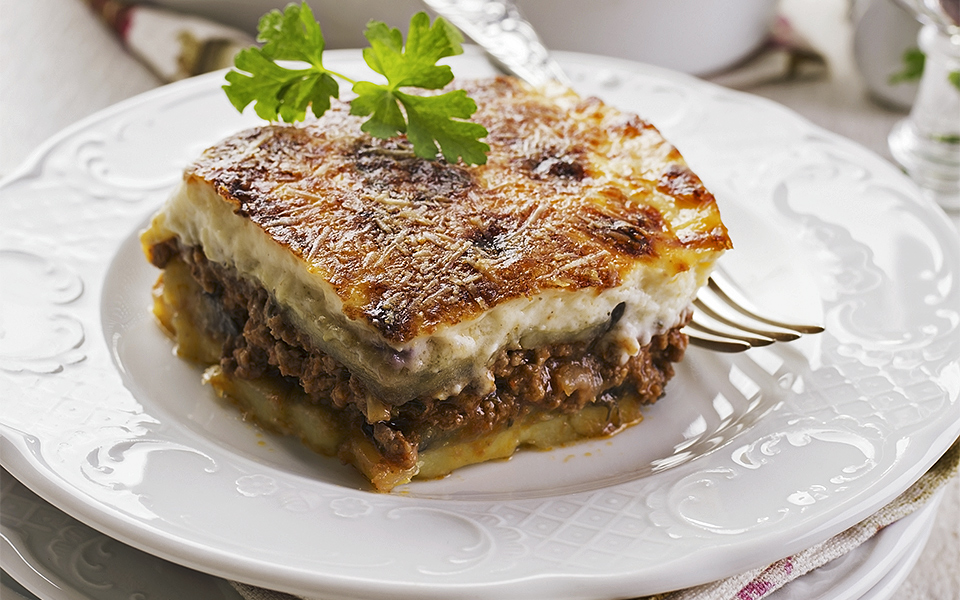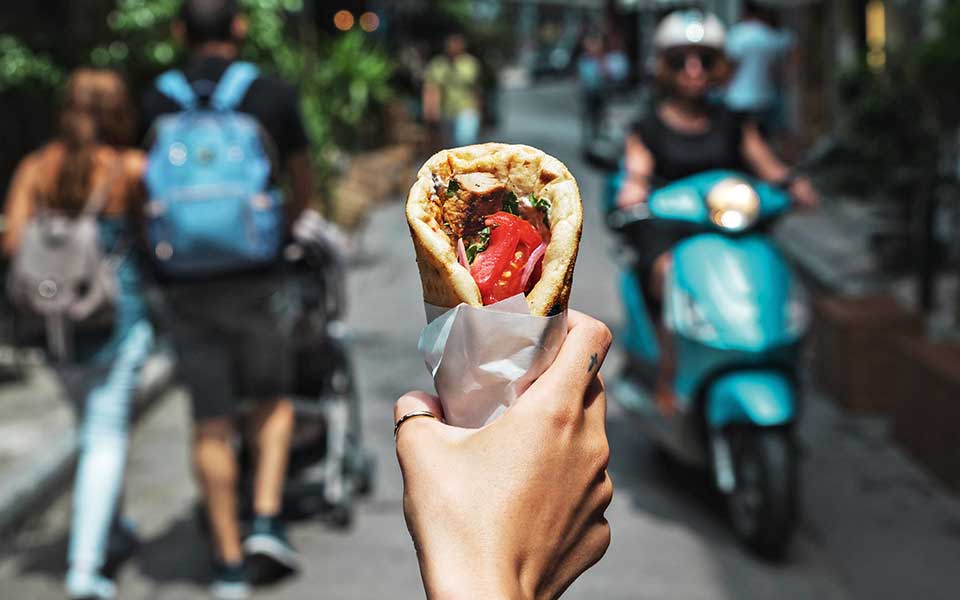“A branch cannot grow without a root. That’s the root I want to explore so as to contribute to its fresh blossoming.”
– Evi Voutsina, Lefkaditika Mageiremata (Dishes of Lefkada), 2008
“Globalization has involved the reconstruction, in a sense the production, of ‘home,’ ‘community’ and ‘locality.’”
– Roland Robertson, Global Modernities, 1995
“We used to cook dishes we’d learned from our mothers: vegetable stews, meatballs, spaghetti with ground beef – regular fare. On Sundays, it would be meat or meatballs in tomato sauce, or maybe chicken or lamb roasted in the oven with potatoes. On holidays, we’d dip into the classic Tselementes cookbook for ideas. I still have my copy. Now I’m in a Facebook group with women from all over Greece where we share so many local recipes, you wouldn’t believe it. Ten lifetimes aren’t enough to cook them!”
– Sofia Kokkinou, home cook, 2018.

© Shutterstock
On the island of Symi, dolmades are made with the leaves of cyclamen flowers, stuffed with rice and herbs, and sometimes with lentils or fava (yellow split peas). Another great dish they make here is lentils with orzo and xerotiganisi, sliced onions that have been gently fried until perfectly golden and sweet.
In Samothraki, lioto is the signature dish, reserved for special occasions at home and church festivals, and made with a strong-tasting meat (mutton or goat) slow-cooked with tomato paste and lots of onions that melt into a finger-licking sauce.
A vegetarian stew of various wild and fragrant greens that are lightly sautéed in butter and oil, then braised in milk and served with a sprinkling of crumbled feta cheese, is a simple, everyday dish in the northwestern region of Epirus.
In the mountains of Achaia in the northern Peloponnese, meanwhile, there’s karkasopita, a pie made with eggs and barrel-aged feta, where they make the dough with the cheese’s brine instead of water. And kiltiritsi is a type of stewed meatball made with bulgur traditional to Kavala and rooted in the Greek Pontian (Black Sea) cuisine.
In Mani, they use lemon when making tomato sauce and in Lefkada, they bake grey mullet in tomato sauce with potatoes.
A fissure seems to have developed in Greece’s culinary culture in recent years, between the touristy moussaka, the classic stuffed tomatoes and the ubiquitous souvlaki on the one hand, and the “exotic” dishes of the country’s local communities on the other.
This phenomenon also appears to have happened quite suddenly. Future historians, sociologists and ethnographers will probably be able to describe this phenomenon more accurately, and in scientific terms, but for those of us who are present at this pivotal phase of Greece’s culinary evolution, it remains inexplicable. How did this come about?

© Shutterstock
It might be that the right moment came for us to dig into the historical depths of Greek cuisine in order to lay foundations for our contemporary culinary myth. We had to be bold in doing this, as it’s a process of introspection that other countries underwent years ago. And it started with a decision by cooks, restaurateurs, farmers and consumers to explore the country, to revive the past and trigger new collective memories.
Information technology and the media have been instrumental, too: blogs, e-socializing and sharing platforms; and long before that, travel and cooking shows set out across Greece to take people on a journey of discovery that covered every nook and cranny of the nation.
Some of the greatest inroads were made by specialist magazines and, before them, by people like Evi Voutsina, who blazed new trails by recording in great depth and scientific detail things that had been overlooked: the origins of our culinary heritage, the history of our recipes and the distinct traits of our local products. She and others celebrated cuisine produced on the smallest of scales, illustrating how dishes arise as a result of very specific factors.
Thanks to this valuable work, a new generation of cooks – well-educated, well-traveled and well-trained in the kitchens of countries with splendid culinary heritages and with well-established culinary identities – cultivated the belief that Greece’s strongest comparative advantage lay in its particularities: its largely unknown local food cultures. There is nothing wrong with a good moussaka or dolma, but Greece’s culinary identity is so much more than that, so much richer. It consists of incredible products arising from a biodiversity rarely encountered in other parts of Europe, a multiplicity that has contributed to an incredible variety of dishes. On televisions all over the world, popular chef Jamie Oliver cooks with feta and Greek yogurt. How could we not use them, too?
And so, as this long process unfolds, we have started to introduce local dishes into our day-to-day cooking, and to favor those restaurants that are helping the country on this journey of self-awareness that takes us beyond ridiculous trends and ephemeral lifestyle crazes. Our good cooks are doing great work, exploring the roots of our foods, adopting the old traditions and drawing out their essences.
In doing this, they’re shaping a new culinary genre, a fresh and young Greek cuisine that respects its rural roots, restoring their lost honor while mindfully adapting them to the present. At the same time, these chefs are also producing the knowledge that will shape our culinary footprint on the world food map. It is much as though we had to look deep inside in order to be able to look out to the world, to go local before we went global.
This is us: souvlaki and stuffed cyclamens.












